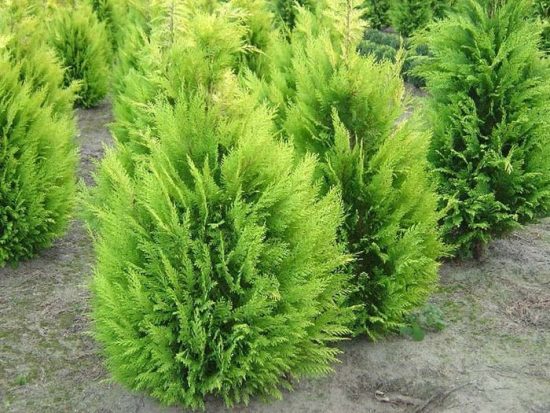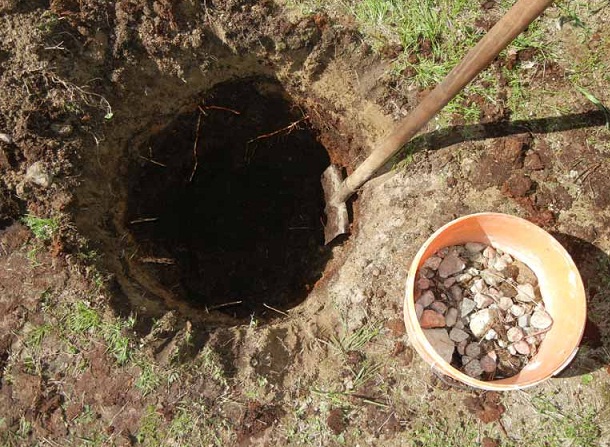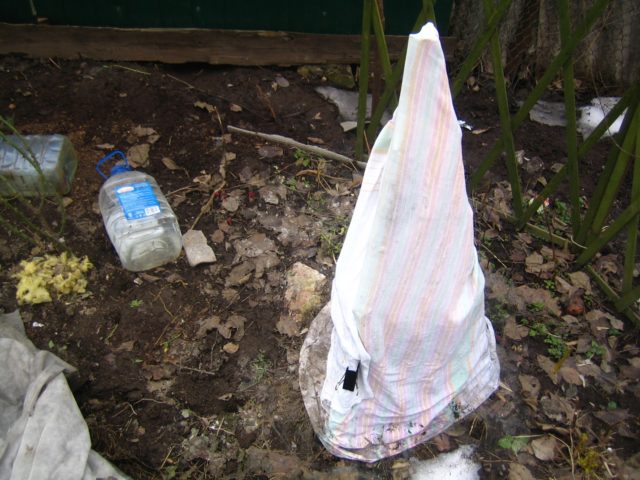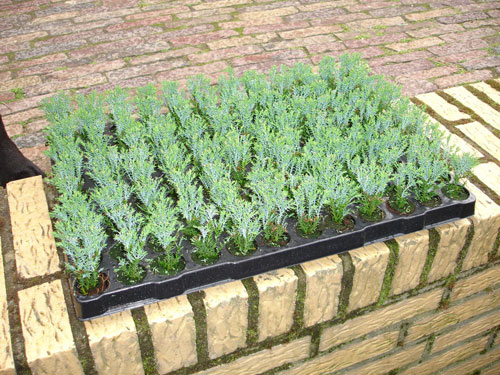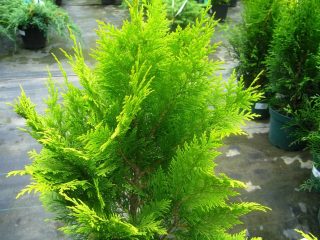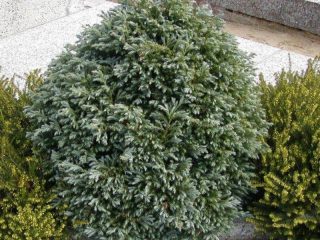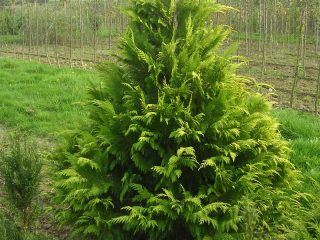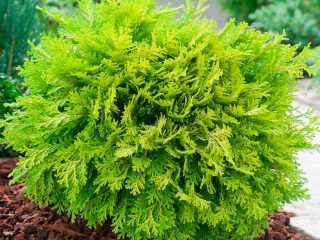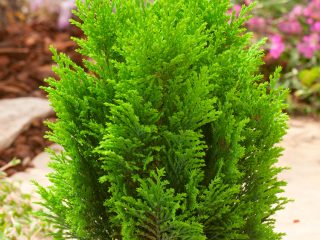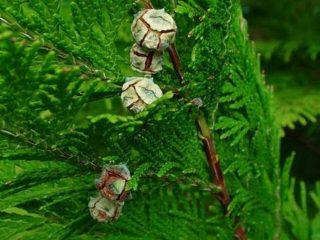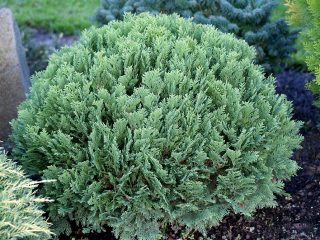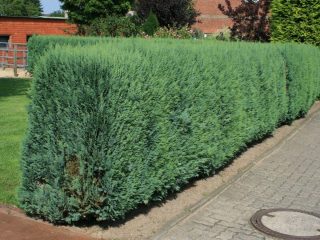Content
Lawson's cypress Yvonne is an evergreen coniferous tree of the Cypress family with high decorative qualities. This variety will serve as a good decoration for the site both in summer and in winter. It is resistant to late blight, has a fast growth rate and is distinguished among other varieties by good frost resistance, so that the tree can be planted in almost all regions of Russia.
In landscape compositions, Lawson's cypress Yvonne is most often used to decorate alleys.
Description of Lawson's cypress Yvonne
The height of the tree is 2.5 m. The plant reaches this mark on average in the 10th year of life, but with a lack of sunlight, it hardly grows higher than 7 m in height. The diameter of an adult tree usually does not exceed 3 m.
As you can see in the photo below, the branches of the Yvonne Lawson cypress grow upward, almost vertically. The crown of the tree is conical and quite dense. If the top of the cypress is too narrow, it may tilt a little to one side.
The bark of the cypress is brownish red. The needles in young plants are represented by many small needles, but in adult trees they are gradually transformed into small flat scales.
The color of the Yvonne Lawson cypress varies depending on the type of soil in which it was planted, but in general, yellowish tones with a green tint prevail. In shaded areas, the needles of the tree are somewhat paler than those of plants that grow in the sun.
Cypress cones are oval and small - no more than 1 cm in width. They differ in type for male and female. The former are pinkish in color, while the scales of the latter are painted in pale greenish tones. As the buds mature, they become covered with a thin waxy coating. In September, the scales open and release a large number of flying seeds.
Planting and caring for a cypress Yvonne
Lawson's cypress Yvonne is planted in open sunny areas. Planting in partial shade is possible, however, with strong shade, the tree does not grow well. When choosing a place for planting, the level of occurrence of groundwater is of great importance - if they are located too close to the surface of the earth, the roots of the cypress can begin to rot. Also, excessive moisture in the soil provokes the development of fungal infections.
Drying out of the soil has no less detrimental effect on the development of the tree, therefore it is imperative to water the near-trunk circle before it begins to crack.
Landing rules
The planting algorithm for the Lawson cypress of the Yvonne variety is as follows:
- The plot chosen for planting is dug up in the fall and fertilized with a mixture of peat, humus, sand and sod land, taken in a ratio of 2: 2: 1: 3. By spring, the soil mixture will rot and form the environment necessary for better survival of seedlings.
- Immediately before planting the plants, a drainage layer of broken brick or crushed stone is placed on the bottom of the planting pits and sprinkled with mineral fertilizers with a high content of nitrogen, phosphorus and potassium.
- It is recommended to dig planting holes to a depth of 20 cm. The distance between two adjacent holes is 1.5-2 m.
- The roots of the seedling are evenly spread along the bottom of the groove and sprinkled with earth, lightly tamping it.
- Planting ends with moderate watering.
Watering and feeding
Yvonne's cypress is a hardy plant, but extremely vulnerable to prolonged periods of drought. In order for the tree to develop normally, it must be watered regularly.
In summer, the frequency of watering is once a week. Leave an average of 1 bucket of water for each plant. Young cypress trees of the Yvonne variety are recommended to be sprayed on hot days.
Young plantings begin to fertilize only 2-3 months after placement in open ground. The Lawson cypress of the Yvonne variety is fed primarily with complex mineral fertilizers, but by mid-July such fertilizing is stopped.
With the onset of spring, when the active growth of the cypress begins, organic fertilizers with a high nitrogen content are applied to the soil. Such feeding contributes to the best green mass gain. Fertilize after watering. After that, the near-trunk circle is watered again, not so abundantly. This is done so that nutrients are absorbed faster into the soil and reach the roots of the cypress.
In autumn, planting is not fed.
Mulching
For better moisture retention, it is recommended to mulch the surface near the cypress trunk. Also, a layer of mulch will serve as a good protection against the spread of weeds, overheating of the soil and freezing of the roots when growing cypress trees in the northern regions of the country.
Material suitable for mulching:
- sawdust;
- needles;
- chopped tree bark;
- wood ash;
- peat;
- straw;
- cut grass.
Pruning
The crown of Yvonne Lawson's cypress can be easily formed if desired. In addition, the removal of part of the shoots by the canopy promotes better shoot formation. To do this, usually remove up to one third of the total number of annual branches.
In the fall, it is necessary to carefully inspect the cypress Yvonne and cut off all the bare branches, since with the onset of cold weather they will dry out. With the onset of spring, another sanitary pruning is carried out, removing broken, frozen or dried shoots. This procedure can be combined by forming a crown and pressing the cypress into the shape of a regular cone.
Preparing for winter
In the description of the Lawson cypress of the Yvonne variety, it appears that this plant is one of the most frost-resistant varieties. Mature trees of this variety are able to safely withstand temperatures down to –25-29 ° С. Despite this, it is better to cover plantings for the winter, especially in regions with harsh winters.
Any covering material is suitable for this: dry spruce branches, burlap, special kraft paper. This is necessary not only in order to protect the root system of plants from low temperatures, but also then to protect the cypress tree from sunburn. This is quite common in May, when the snow begins to melt.
Reproduction of cypress Lawson Yvon
There are several ways to propagate Yvonne's Lawson cypress. It can be done:
- by cuttings;
- by the seed method;
- through layering.
From this list, the most popular is the propagation of cypress by cuttings. This is due to the simplicity of the method and speed - when growing a tree with cuttings, a young plant can be obtained most quickly.
The algorithm for grafting the Yvonne variety looks like this:
- In the spring, during the period of active growth of the cypress, it is necessary to cut off part of the shoots up to 35 cm long, but not less than 25 cm.In this case, young branches should be selected for reproduction.
- After cutting, the cuttings are buried in loose moist soil and covered with plastic wrap or a bag.
- The containers with the planting material are moved to the greenhouse.
- Seedlings are periodically sprayed so that the soil in containers with plants does not dry out.
- After 3 weeks, the cuttings will form the first roots. After 1-2 months, they will take root, after which they can be transplanted to a permanent place.
Seed propagation is time consuming. In this way, Yvonne's cypress is propagated according to the following scheme:
- In the fall, seeds are taken out of ripe cones.
- They are dried at a temperature of + 40-45 ° C.
- This is followed by the procedure of seed stratification. To do this, they are soaked in water at room temperature for 6 hours.
- Then the seeds are sent for storage. They are packed in a paper envelope and stored at a temperature not lower than + 5 ° C. The germination of the planting material is maintained for a long time - the seeds can be sown even 15 years after collection.
- In October, seeds are planted in containers and taken out into the street until February. At the same time, in order to avoid freezing, they are covered with dry grass or snow.
- In March, the containers are brought into the house. In early April, the first shoots should appear. Then they begin to water moderately and cover them to protect them from direct sunlight.
Seed propagation takes at least 5 years. Only then is it possible to land on a permanent place.
It is much easier and faster to reproduce the Yvonne variety through layering. To do this, you must adhere to the following algorithm:
- The lower shoot of the cypress is carefully bent to the ground.
- The end of the branch is fixed to the ground so that it does not unbend.
- The bent shoot is watered in the same way as the parent bush. After a year, it is separated from the adult plant.
Additionally, the procedure for propagating cypress by cuttings is described in the following video:
Diseases and pests
The Lawson cypress of the Yvonne variety is rarely affected by disease. Late blight of the root system is identified as the main threat. Sick plants must be dug out at the first signs of the disease - the rapid wilting of the shoots. The dug cypress is burned away from the garden. The remaining plantings are sprayed with any fungicides.
Of the pests, the following insects are the most dangerous:
- miner mole;
- aphid;
- bark beetles;
- spider mite;
- cherevets;
- shield;
Conventional insecticides work well with them.
Conclusion
Yvonne's Lawson cypress is not so difficult to grow - even beginners can do this task. Most often, the variety is used in flower arrangements in combination with other conifers: spruces and thujas, but you can also combine them with roses and other perennial garden crops. Yvonne's cypress tree looks equally impressive both in single plantings and in group ones. Growing a tree is possible in the open field and in special spacious containers.
